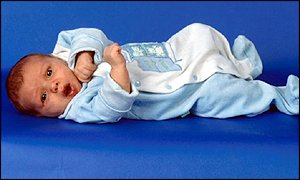
Human cloning: The 'terrible odds'
URL: http://news.bbc.co.uk/hi/english/sci/tech/newsid_1211000/1211482.stm
Date accessed: 15 March 2001
Friday, 9 March, 2001, 15:05 GMT
The proposal by an Italian doctor and an American scientist to attempt to produce human clones would be the height of irresponsibility were it allowed to take place.
There are limits on how far the desire to be a parent justifies
grabbing any form of technology in order to meet our desires
|
|
|
The practice has already been outlawed by the European Convention on Human Rights and Biomedicine, covering not just the EU but all European states. The fact that the scientists are prepared to go "offshore" is testimony to the degree to which the practice is regarded as professionally, medically and ethically unacceptable.
Ethically, there is a widespread international understanding that to clone a human being is wrong. In our view, to clone is to exercise an unprecedented control over someone else's complete genetic makeup.
Welfare problems
Cloning is quite different from the randomness of identical twinning, where an embryo of unique and so far unknown genetic type spontaneously divides. Cloning takes the genetic material of an existing person and uses it as the basis of a new person.
This does not mean an identical person, of course. All the other aspects we call "environmental" factors will be different. For the first time, a person would come into the world, however, who had had all their genes preordained by someone else.
We argue that this is intrinsically wrong. We can reject the forms of "control" in our upbringing, education and social influences, but we cannot change our genes.
Equally important, it would be unthinkable in terms of medical risk. In 1998, the Farm Animal Welfare Council of the UK Ministry of Agriculture called for a moratorium on commercial uses of animal cloning, because of the serious welfare problems encountered when several animal species have been cloned.
Terrible odds
In such a context, it would be criminally irresponsible to attempt a technique on humans which is known frequently to cause deformities, large foetuses and premature deaths in sheep and cattle. This departs from any medical justification.
There are also unknown psychological factors. No-one knows or could know what it would be like to be the clone of one's father or mother, nor what expectations and distortions it would put on relationships in the family. But the precautionary principle suggests these are risks we should not run.
Childlessness afflicts many couples, my wife and I included. Technologies like IVF have given many possibilities for helping the situation. But there are limits on how far the desire to be a parent justifies grabbing any form of technology in order to meet our desires.
A good life is still possible without children, after all. As things currently stand, the chances for any couple contemplating offering themselves for this new programme are that cloning would be more likely to produce deformed babies, miscarriages and early deaths than a healthy baby. No desire for a child is worth such terrible odds.
The author is director of the Society, Religion and Technology Project, which assesses ethical issues in technology for the Church of Scotland.
Categories: 4. Ethical and Social Concerns Arising out of Biotechnology, 33. Cloning